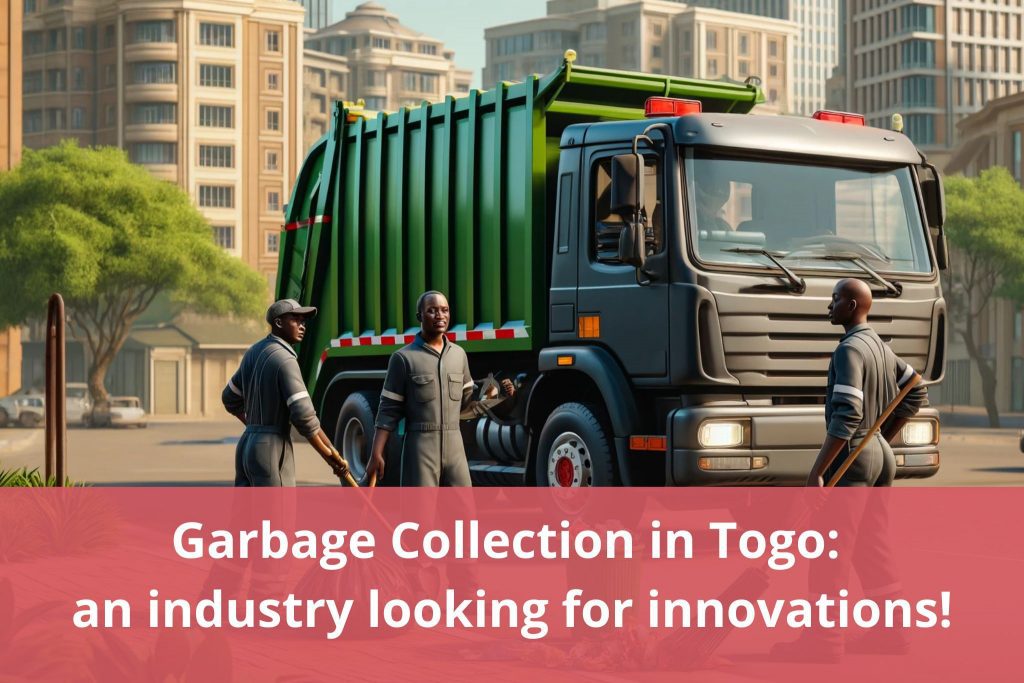In Lomé, the capital of Togo, the solid waste management system underwent a reorganization in 2008. A cornerstone of this reorganization is household waste collection, conducted directly at residents’ homes. This led to the emergence of associations and specialized companies responsible for door-to-door waste collection. Initially, this was done using man-powered carts, but in recent years, motorized vehicles have been employed. This service is not free and requires a monthly subscription, which can create some issues. In response to these challenges, some industry players are innovating, for example, by integrating solutions like SEMOA’s CashPay.
Subscriber management challenges
Households primarily pay their subscriptions in cash, and sometimes via mobile money. However, collection companies often face difficulties in tracking payments. Typically, they must hire a full-time person to manage collections or verify whether households have paid, to determine if they can continue to receive the service. Households that are up-to-date with their payments receive a sticker to place on their door or gate, indicating they are properly subscribed.
On one hand, there is a risk of revenue loss when cash payments are collected directly by garbage collectors. On the other hand, the cost of collection can increase if a dedicated person is hired to handle payments. Additionally, management does not always have complete visibility over whether all households have paid and that funds have not been diverted by those responsible for collections. This is particularly critical for mobile money payments, as it requires matching the phone numbers of the payers with the subscriber database to ensure that each transaction is correctly recorded.
Service beneficiary constraints
Households wishing to benefit from the waste collection service must be available on the day of subscription renewal. Cash payment poses challenges as it requires having the exact change to avoid complications related to giving back change. The requirement to be physically present to make the payment can cause stress and inconvenience.
Moreover, this obligation to be present at the time of payment means that households need to plan ahead and ensure they do not miss the renewal date. This represents an additional mental burden for families, especially those with busy schedules or multiple responsibilities.
A delay or forgetting to pay can lead to a suspension of the waste collection service, which can have unpleasant consequences such as the accumulation of garbage. This can also become a public health issue and attract pests. For households, the interruption of service may necessitate finding temporary solutions to manage their waste, which can be costly and inconvenient.
Overall, these constraints make the payment process a major point of friction in the waste collection system, making the service experience less user-friendly for beneficiaries.
Innovative approach to facilitating subscription payments
To address the issues related to traditional cash payment methods and logistical constraints, some waste collection companies in Lomé are adopting innovative approaches. For instance, AGIP-BTP offers its customers electronic solutions through SEMOA’s CashPay. This system allows households to renew their subscriptions securely and conveniently, and each customer is identified at the time of payment, eliminating the need for reconciliation by the collection agency unlike direct Mobile Money payments.
With CashPay, customers receive a monthly invoice via SMS or email, eliminating the need for physical contact or having exact change. Customers can then make their payments through various electronic platforms, such as Tmoney, Flooz, Coris Money, or even by bank card (Visa and Mastercard). This reduces the stress associated with cash payments and offers more flexibility for customers who can pay their bills from anywhere, at any time.
This innovative approach has several advantages for both companies and customers. For companies, it reduces logistical costs associated with collecting cash payments and minimizes the risk of misappropriation of funds. It also provides better visibility into payments, which facilitates subscription management and route planning for collections.
For customers, it means more convenience. They no longer need to be physically present to pay their subscription, which allows them to manage their time more effectively. Additionally, electronic payment reduces the risk of theft or assault associated with carrying cash.
Innovations like CashPay also create opportunities for customer loyalty. Companies can use these systems to send reminder notifications, offer special deals, or collect feedback, thus improving customer relations and overall satisfaction.
Ultimately, the innovative approach of some companies demonstrates that the waste collection sector in Lomé can evolve towards more modern and efficient solutions, benefiting both customers and businesses. These solutions can help make the waste collection service more sustainable, secure, and tailored to the needs of urban households.
Other innovation avenues to transform the waste collection industry
Beyond electronic payment solutions, other innovative avenues could help improve waste collection in Lomé. For example, replacing door stickers with unique QR codes for each household. These QR codes would allow customers to automatically receive their invoices and access payment options directly, facilitating subscription tracking.
Additionally, establishing a web portal or a mobile app would provide customers with a convenient way to check their subscription status and renew it online. This approach could also serve as a customer relationship management (CRM) platform, where companies could collect feedback and manage complaints more effectively.
Coupled with other technologies, these innovations would also allow collection companies to optimize their operations, for example, through geolocation of collection points and planning tools. This could reduce logistical costs and improve service reliability.
All these innovations can be implemented thanks to the flexibility of SEMOA’s CashPay, which offers features that meet these specific needs.





